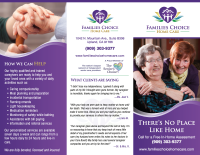If you have a loved one who is suffering from Alzheimer’s disease, you’re probably trying to learn all that you can. Knowing more about the disease will help you better understand the transition that your loved one is going through each and every day.
Here are several facts about Alzheimer’s that you might not have previously known. Be sure to consider all these facts as you help your loved one cope with and adjust to life with the illness.
1. It’s a Form of Dementia
You may be wondering what the difference is between Alzheimer’s and dementia. The truth is, dementia is an umbrella term for different types of memory loss. Alzheimer’s is one of a variety of types of dementia, including Huntington’s disease, Lewy body dementia, Parkinson’s disease dementia, and vascular dementia.
2. More Than 6 Million Americans Have It
You might be curious to see how many people are dealing with the same disease that your loved one is going through.
If you have a family member or friend diagnosed with Alzheimer’s, you are not alone. In fact, there are more than 6 million people living with Alzheimer’s disease at any time.
3. It’s Believed to Be Genetic
Alzheimer’s disease as a whole isn’t fully understood by medical experts. There’s still much research that needs to be done in order to fully comprehend the magnitude of the disease.
However, significant studies have indicated the disease has a genetic factor in it, but it isn’t the only major factor. Research has also found a tie-in to other factors such as the subject’s lifestyle and the environment in which they lived.
Combined, these three factors lead to the disease beginning up to 10 years prior to any noticeable signs.
4. It’s More Common in Women
By merely looking at the statistics of Alzheimer’s disease each year, it’s easy to see that there are almost twice as many women suffering from it than men.
Studies have also shown that they’re affected by Alzheimer’s earlier and regress much faster. That’s because the brain shrinks at a faster rate in women that have Alzheimer’s rather than it does in men.
5. Young People Can Get It Too
Many times, Alzheimer’s disease is associated with the elderly population and older people in senior care services. However, while it’s very rare, there are people that can start to show symptoms of developing Alzheimer’s disease as early as 30 years old.
6. There’s Still Much to Learn
Many experts believe that modern science hasn’t even cracked the surface of Alzheimer’s and all there is to learn about the disease. In fact, many medical officials fear that modern doctors and treatments aren’t prepared for the growing number of Alzheimer’s patients in the next decade.
The good news is that foundations such as the Alzheimer’s Association have dedicated their resources to learning more about the disease and distributing the information that they find, with new discoveries and potential therapies on the horizon.
This is especially helpful to people who are trying to support their loved ones as much as possible.
7. Heart Issues Lead to Brain Issues
Science has shown that health issues with your heart can lead to issues in your head over time, and vice versa. In fact, many Alzheimer’s patients have a history of conditions such as diabetes, high cholesterol, or high blood pressure, to name a few.
Patients that don’t exercise regularly or eat an unhealthy diet are far more prone to Alzheimer’s as well.
While some heart conditions might be hereditary, most of them can be prevented, or at least limited with a proper diet and exercise routine. Be sure to prioritize that for both your loved ones as well as yourself.
8. It’s the 6th Leading Cause of Death
The unfortunate reality of Alzheimer’s is that it’s one of the most lethal diseases in the modern era.
It’s the 6th leading cause of death for adults. To put that into perspective, it kills more people each year than breast cancer and prostate cancer put together.
While the death total continues to climb since the COVID-19 pandemic, with proper senior home care, your loved one can attempt to fight those statistics and lead a happy life.
9. Caregivers Often Deal with Depression
Many caregivers of Alzheimer’s patients have reported that they are dealing with depression and high amounts of stress when tending to their loved ones. If you’re going to assist your loved one, then you need to make sure you have a support system.
You might even consider seeking a counselor who can help you talk through everything in the most helpful way possible.
If you’re trying to understand dementia a bit better, then be sure to read this article for several tips on how to care for a loved one with dementia. For more inquiries on our services, questions about a person in your life living with Alzheimer’s, or additional concerns, please contact us and we’ll be happy to assist you further.






